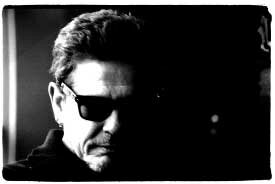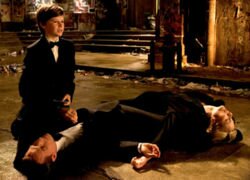
CYRANO'S JOURNAL®
CINEMA |Batman Begins (2005)Directed by Christopher NolanReviewed by John Steppling |
http://www.cjonline.org
|
Our contributors' latest pieces
"Like most [comic-book heroes], Batman is, essentially, a vigilante..."
|
ALL RIGHTS RESERVED, 2005 CJONLINE.ORG & SPECIFIC AUTHORS. PLEASE SEE OUR COPYRIGHT NOTICE.
|
Young Bruce Wayne, after his parents' murder.
It's hard to talk about this film, or any "super-hero comic book film", without talking about super-heroes per se. These super-egos in tights....how to explain their popularity? Just a quick random survey yields certain themes—costumes, masks (more on that in a minute), absent or lost fathers, an alter ego, and in the case of American comic book heroes, an over-active conscience (that Puritan thing). The Lone Ranger had a mask, so did the Man in the Iron Mask (obviously). If one takes Zorro, say, you have the mask — an alter ego, and a father to be avenged. Interesting. An aristocratic Don Diego de la Vega poses as a foppish playboy by day, but dons the mask and cape of Zorro by night to fight the corrupt Spanish occupiers. Sound familiar? The first Zorro story was written in 1918. Why is it always a father and not a mother? This whole schizophrenic alter ego thing is pretty interesting. (note to self: must google Jung and see if he wrote on super hero archetypes).
Batman (the subject of this summer's Warner Bros blockbuster) was born (as it were) around 1939—same era as Superman and Captain Marvel — and has been the most durable of the comic book characters for the filmic world. Like most of them, he is, essentially, a vigilante. Comic books were aimed at lost and aimless teenage boys — the same ones who read (today) Joe Weider muscle magazines. The appeal of hidden gifts and abilities to a scrawny pimple-faced underachiever is obvious, but it doesn't really explain the iconic status of characters like Batman.
The original Batman hasn't really changed much in his essentials. Son of billionarie industrialists, orphaned because parents were murdered, and then transformed (due to his search for meaning around the globe) into a covert crime fighter. Now, the early illustrators of DC and Marvel comics did manage to capture something of the urban angst of mid 20th century America (much as R. Crumb did, decades later). That sense of proletarian imagery has never yet been done justice (er, wrong word maybe) by Hollywood. Tim Burton did the first two Batman films and has been over-appreciated for his "style", I think. There really isn't much style in Burton, but in comparison with what follows it's easy to understand how he might seem a genius. The comic book world is driven by an almost Manichean battle between good and evil —- it's like a modern version of medieval mystery plays (actually, last year's Constantine WAS a literal battle between Satan and god....and one of the best comic book movies— and oddly, one of the least successful). The battle with infinite evil is a fascinating theme, and can be found in everything from Frankenstein to Alien to Paradise Lost. The infinitude of evil has psychoanalytic underpinnings, and is a huge topic, but for the purposes of talking about Chris Nolan's film it's worth examining at least in outline. If one looks at, say, Dick Tracy, one sees the same mutant villians — the same stark black outlines and grotesquerie. Same with almost all the DC and Marvel inventions, and the same with later cartoon worlds. It is an ultra-realism, a hyper-world of exaggeration. This is the primordial feel of limitlessness. From this chaos springs Satan (and interesting to note here the effects of the Enlightenment on the idea of Satan). That Gotham City is always shown at night is no accident (Metropolis, home to the more boring and domesticated Superman, is always shown in daylight). The power of chaos is linked to the night. To the seductiveness of a world of no boundaries — of the Id. The Marvel and DC comics all gave great attention to the villians, to the sense of power and darkness that surround men and society — and this sense of powerlessness is a prime causal agent for these strips.
Milton's Satan has always been more attractive than the forces of good. Batman exists in a world that is almost always midnight, and keeps one foot on the dark side — which I think accounts for his appeal. The problem though, at least in all the recent Batman films, including Batman Begins, is that the dark side is always something less than limitless and seductive. Alongside that is the essentially reactionary vigilante authoritarianism of Batman himself. Nolan does a lot of sommersaults to try and apologize away Bruce Wayne's privileged background — but it's there no matter how much you make dad a "great philanthropist" (who built a subway for the poor, so they could get to work.....gosh, thanks Dad) there is still a cavernous (er wrong word again, I think) class divide. In Batman Begins the city of Gotham is awash in corruption, crime, and disease. The reasons for such a state are, not surprisingly, never analysed much. The fact that, by the end, the chief problem is a mysterious and shadowy league of wrongdoers called, well, the League of Shadows, is to be expected. Complex social questions are not the purview of comic books. An easily identifiable evil is needed, a concrete manifestation of bad to be fought and conquered must be inserted into the narrative. And so it is.
Nolan's breakthrough feature was Memento, a clever but empty piece of high concept followed by the slightly more interesting Insomnia, with Al Pacino. Now, with a giant jillion-dollar budget, Nolan does a Batman by the numbers. He is smart enough to cast an array of veteran and accomplished actors; the under-used Rutger Hauer, the overused Morgan Freeman, and the always terrific Tom Wilkinson — not to mention the deft Gary Oldman and stalwart Michael Caine (all veteran actors get an adjective with this critic). Such talent does inject a sense of life into a lot of pretty empty dialogue, but in the end can't rescue the film from its utter predictability. Christian Bale is fine as Batman — a sort of poor man's Val Kilmer in some ways, he attacks the part with the same strategy and, really, is pretty good on the whole (Keaton attacked it from a sort of inverted position, but ended up uncertain of the difference between manic comedy and steely determination, and Clooney, well, Clooney is better left to shooting his cuffs in facile junk like Ocean's 11 and 12). A note here on Katie Holmes; who is, without question, the worst actress to appear in major Hollywood films in a long long time. Can someone please tell her to stop making that one idiotic crooked face. Please. Can't act, isn't hot — why is she working?
Ok, so where does all this leave us? Batman Begins is, like War of the Worlds, amazingly noisy. It is also much better than Wow. You don't go to Batman movies expecting much, and here you won't get much, but at least Nolan isn't pretending to offer much. I return then to the whole issue of comic book super heroes. The mask thing needs a comment or two. Why masks? A good deal of theatrical tradition is attached to the wearing of masks. It also has a long history connected to rituals and magic. The sense of identity is crucial to humans, it seems. This identity is, not to sound too Buddhist, mostly illusion — all the more reason to keep shoring it up. The wearing of a mask allows one the freedom to lose our sense of self. When we lose our sense of self we become more who we really are — hence its endless appeal. The secret identity of Superman or Batman or Zorro, et al is part of the allure of these figures. Who are they, really? At the end of Batman Begins, Ms Holmes even mouths a line or two about who the real Bruce Wayne might be — crime fighter or playboy billionaire? Who is really wearing the mask? It's the only question in the entire film worth asking and, to Nolan's credit, it's asked at the end.
Let's not forget, however, the basic lack of complexity here — the shallow excuse for social critique that allows for vigilante "justice" and a strange acceptance of the hierarchies of this system. This film is in many ways a valentine to Capitalism, a sort of neo-liberal updating that even includes a villian talking about economic destruction (which I doubt meant structural readjustment. Second note to self: see if Thomas Friedman and Jeff Sachs liked this movie). One wonders at the fascination with what is almost Biblical revenge in these stories. Sherlock Holmes, for example, solves things before they happen (usually) while action films (comic book or otherwise) tend to focus on the revenge of grievous crimes — that have already happened. For America there is just something more satisfying about watching the bad things happen — and cleaning up later. This is likely too big a topic for this review — but it's worth pondering. The American notion of heroism is never connected to thinking before-the-act, or to mediation or planning. It is simply action, a pure response to an "uncivilized" event.
A good video antidote might well be a double feature of Jacques Tourneur. Most famous for his classic noir, Out of the Past (1947...also worth a rental), Tourneur, under the guidance of Val Lewton (producer) made Cat People (1942), and later the much neglected Leopard Man (1943) The latter with an excellent script by the great Cornell Woolrich... Both are stylish and sinister and suggestive of that infinite evil I was speaking of earlier. Leopard Man is a mere 59 minutes yet is one of the scariest films ever made.
—JS
ABOUT JOHN STEPPLING Playwright, director, screenwriter and teacher, Steppling was an original founding member of the Padua Hills Playwrights Festival and has had his plays produced in London, LA, New York, Paris, San Francisco, and Poland. Plays include The Shaper, Teenage Wedding, Neck, Dog Mouth, The Thrill, Wheel of Fortune and My Crummy Job. A collection of his work was published by Sun and Moon Press in 1999 (Sea of Cortez and Other Plays). He is a Rockefeller Fellow, multiple NEA recipient, and PEN-West winner. His last film credit was Animal Factory (directed by Steve Buscemi 2000). Steppling lives in Lodz with Norwegian director Gunnhild Skrodal, and teaches at the Polish National Film School.
|

